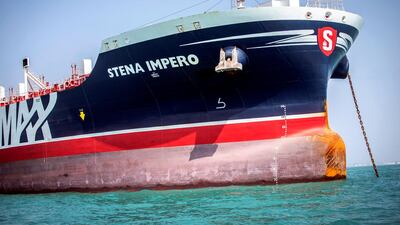The British-flagged tanker the Stena Impero, which was seized by Iran in the Strait of Hormuz in July, is free to leave, Tehran said.
Iran detained the tanker on July 19, two weeks after the Gibraltar government detained the Iranian Grace 1 tanker — which has since been renamed Adrian Darya-1 — on suspicion of breaching European Union sanctions by transporting oil to Syria, which Tehran denied.
Although seven crew members were released, 16 remain on board.
Iran's government spokesman Ali Rabiei said on Monday that the "legal process has finished and based on that the conditions for letting the oil tanker go free have been fulfilled and the oil tanker can move".
He did not specify when the Swedish-owned vessel would be allowed to set sail.
The Stena Impero was impounded at Iran's Bandar Abbas port for allegedly failing to respond to distress calls and turning off its transponder after hitting a fishing boat.
Stena Bulk, the company that owns the tanker, said on Sunday that it expected the vessel to be released soon, but expressed caution about the situation.
"We understand that the political decision has been taken to release the ship," Stena Bulk's chief executive Erik Hanell told Swedish television station SVT.
"We hope it will be able to leave in a few hours, but we don't want to take anything for granted. We want to make sure the ship sails out of Iranian territorial waters," he said.
The seizure of the Stena Impero was seen as a tit-for-tat move after the Grace-1 seizure.
Grace-1 was released by the British territory on August 18 after authorities in Gibraltar received written assurances from Iran it would not sell the oil in Syria. Having turned the tracker turned off, the vessel went on to sell the oil there regardless.
Tehran denied it had made any promises about the destination of the ship and the United States had previously warned it would impose sanctions on any buyer of Iranian oil after the ship left the British territory.
France's President Emmanuel Macron said on Monday that he still hopes to mediate between Iran and the United States to help ease tensions in the Arabian Gulf.
Speaking to reporters flying with him to the United Nations General Assembly in New York on Sunday, Mr Macron said he remains "cautious" in attributing responsibility for the recent attacks on oil facilities in Saudi Arabia.
The US, Saudi Arabia and the United Kingdom blame Iran for the attacks.
As US President Donald Trump and Iranian President Hassan Rouhani are taking part to the high-level UN meetings, Mr Macron said "both protagonists are there … Something may happen."
Mr Trump, however, said on Sunday that "Nothing is ever off the table but I have no intention of meeting with Iran".
But Mr Rouhani criticised the US on Monday, saying new sanctions blacklisting Iran's central bank for a second time pointed to Washington's "desperation" in the face of Iranian resistance.
"Americans are sanctioning institutions that have already been blacklisted. This signals America's complete desperation and shows that it's "maximum pressure" has failed ... as the great Iranian nation has resisted successfully," Rouhani said in remarks carried by state television.
The president said he would introduce a regional peace plan dubbed Hope (Hormuz Peace Endeavour) at the United Nations General Assembly this week.
"All countries of the Persian Gulf and the Strait of Hormuz and the United Nations are invited to join," Mr Rouhani said before leaving for New York.
Already in New York, Mohammad Javad Zarif, Iran's foreign minister, told US television that his country was steeled for a conflict with the US. He told CBS Face the Nation that the consequences of even undertaking limited strikes in retaliation for this month's attack on Saudi Arabia's main oilfield, would not easily contained.
“I’m not confident that we can avoid a war. I’m confident we will not start one, but I’m confident that whoever starts one will not be the one who finishes it,” he said. “That means there won’t be a limited war.”
Mr Macron has taken a leading role in efforts to try to save a 2015 nuclear agreement with Iran, following Mr Trump's decision to pull the US from the deal and impose new sanctions.
The move led to fraught relations between the two countries as the sanctions have crippled Iran's economy, and they have violated the deal on three occasions recently.
This year’s UNGA, which starts on Tuesday and ends on September 30, will attract world leaders from 136 of the 193 UN member nations, with the perilous state of peace and security high on the agenda.
“Our fraying world needs international co-operation more than ever, but simply saying it will not make it happen,” UN Secretary-General Antonio Guterres said on Sunday. “Let’s face it: We have no time to lose.”
Last week, Mr Guterres repeated warnings that “tensions are boiling over”. The world, he said, “is at a critical moment on several fronts – the climate emergency, rising inequality, an increase in hatred and intolerance as well as an alarming number of peace and security challenges.”
With so many monarchs, presidents and prime ministers at the UN this year, “we have a chance to advance diplomacy for peace,” he said. “This is the moment to cool tensions.”

